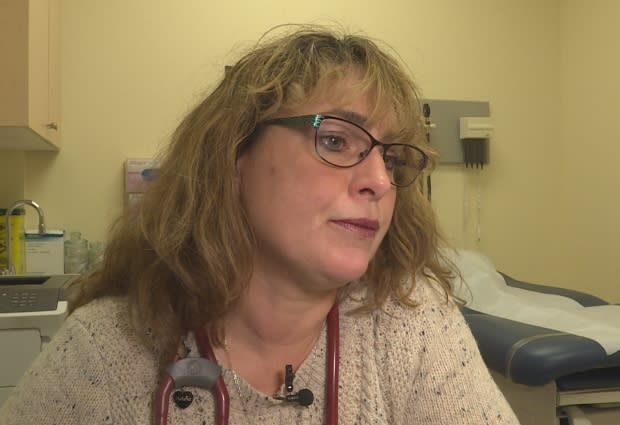'It's stressful': No end in sight to nurse shortage in Bathurst
Patients and health-care professionals in the Bathurst area say they do not know when the obstetrics department might open again and have been told by the health authority to prepare for the worst.
The obstetrics unit at the Chaleur Regional Hospital first closed on Oct. 22 for a few days, then reopened briefly. But it shut down again a few days later, and on Nov. 5, it was announced it would remain closed "until further notice."
The Vitalité Health Network blames a lack of nurses.
Beresford's Cinthia-Line Boudreau had to find this out the hard way. She was already nine hours into labour.
"The doctor came into the room and took my hand and looked me straight in the eye and said, 'This is not news I like to give to a patient — unfortunately there are no more nurses available for you tonight. We have to transfer you to another hospital,'" said Boudreau.
She was then taken to Campbellton, where she gave birth after 28 hours of labour.

Véronique Décoste is due in a month. But she's been told by staff she should have alternative plans for her delivery.
"They don't know much either, except that nothing should change right now," said Décoste.
"It's stressful."
Vitalité said it already had to tell more than 30 expectant women from the Bathurst area to change their plans, and prepare to give birth either in Campbellton or Miramichi, each about an hour away.
Saw this coming
Dr. Natalie Cauchon, a family doctor at the Nepisiguit medical clinic who also works at the hospital's obstetrics unit, said the Campbellton and Miramichi hospitals are close to being overwhelmed — and Miramichi had to turn down a pregnant woman last week because it was over its capacity.
She also said she saw this coming and has tried to warn authorities for the past year.
"We knew we would have a shortage of nurses," said Cauchon.

"We asked the administration time and time again within the last few months. We've been repetitively meeting with the administration to ask for a new nurse post to be provided. Nothing was done until now. It's as if Vitalité had to wait for a crisis to happen before acting."
She said she and other doctors would like to be able to deliver babies in Bathurst while the crisis is addressed, but their hands are tied.
"Such an essential service in a regional hospital shouldn't be closed. It's completely unacceptable," she said.
"It's a sad situation."
376 nurses needed
The nursing shortage in Bathurst is hardly unique.
The obstetrics department at the Waterville hospital also recently closed for a few days under similar circumstances, with patients there redirected to Fredericton or Edmundston.
In all, there are 376 nursing vacancies across the province, according to numbers obtained by Radio-Canada.
Two hundred of those are in the Vitalité Health Network, and 176 in the Horizon hospitals. They affect all corners of the province.
Cauchon said under those shortages, nurses who are employed are overworked, only compounding the problem.
"Some nurses had to work overtime, sometimes 18-hour shifts — 24-hour shifts, really long hours in stressful situations," she said.

Boudreau witnessed this first-hand.
She said when she was transferred to Campbellton, a nurse who had been at work for 24 hours and was about to finish her shift, offered to come with her in the ambulance.
"They go above and beyond, that's why there are shortages now. They work themselves out," said Boudreau.
Shortage not unique to hospitals
The demand for nurses goes beyond the hospitals.
In nursing homes, nursing shortages are such a significant problem, the New Brunswick nursing home association created a recruitment and retention program six months ago, aiming to improve working conditions to retain nurses, and actively recruiting in universities, even outside the province.
At the time the program started, there were dozens of vacancies.
In some areas of the provinces, the shortages have become so acute, patients are no longer admitted to nursing homes.
Maurice LeBlanc, 79, from Bathurst, has been waiting one year for a place in a nursing home for his 71-year-old wife, who has Alzheimer's disease.

Last March, LeBlanc was told the nursing home where his wife was on a waiting list — Foyer Notre-Dame-de-Lourdes — was not taking any more patients for now because of staff shortages.
"I've been told that unfortunately she can't get in there until they find more people to work," said LeBlanc.
The nursing home's website lists three staff vacancies — two nursing positions and one for an attendant.
LeBlanc's wife is considered at the top of the list.
But what it means, according to what LeBlanc has been told, is that she will likely be admitted next June — a year and a half after the wait began.
In the meantime, she is at the Bathurst hospital, where LeBlanc spends up to eight hours each day helping to care for her.
"I don't know how long I can keep up with it," he said.
The irony is his wife worked for 22 years before her retirement at the very nursing home where LeBlanc would like to have her placed.
New premier wants more information
Premier Blaine Higgs said he has been told by the nursing association they are expecting a shortage of 5,000 nurses in the next five years.
"I want to understand the categories of where we have the shortages," he said.
"I mean is it hospitals, what level of care are we talking here? Prioritize that level of care so that we start to deal with those particular places. But also look at how many people are graduating, where are students going when they graduate, are they staying in New Brunswick?"

